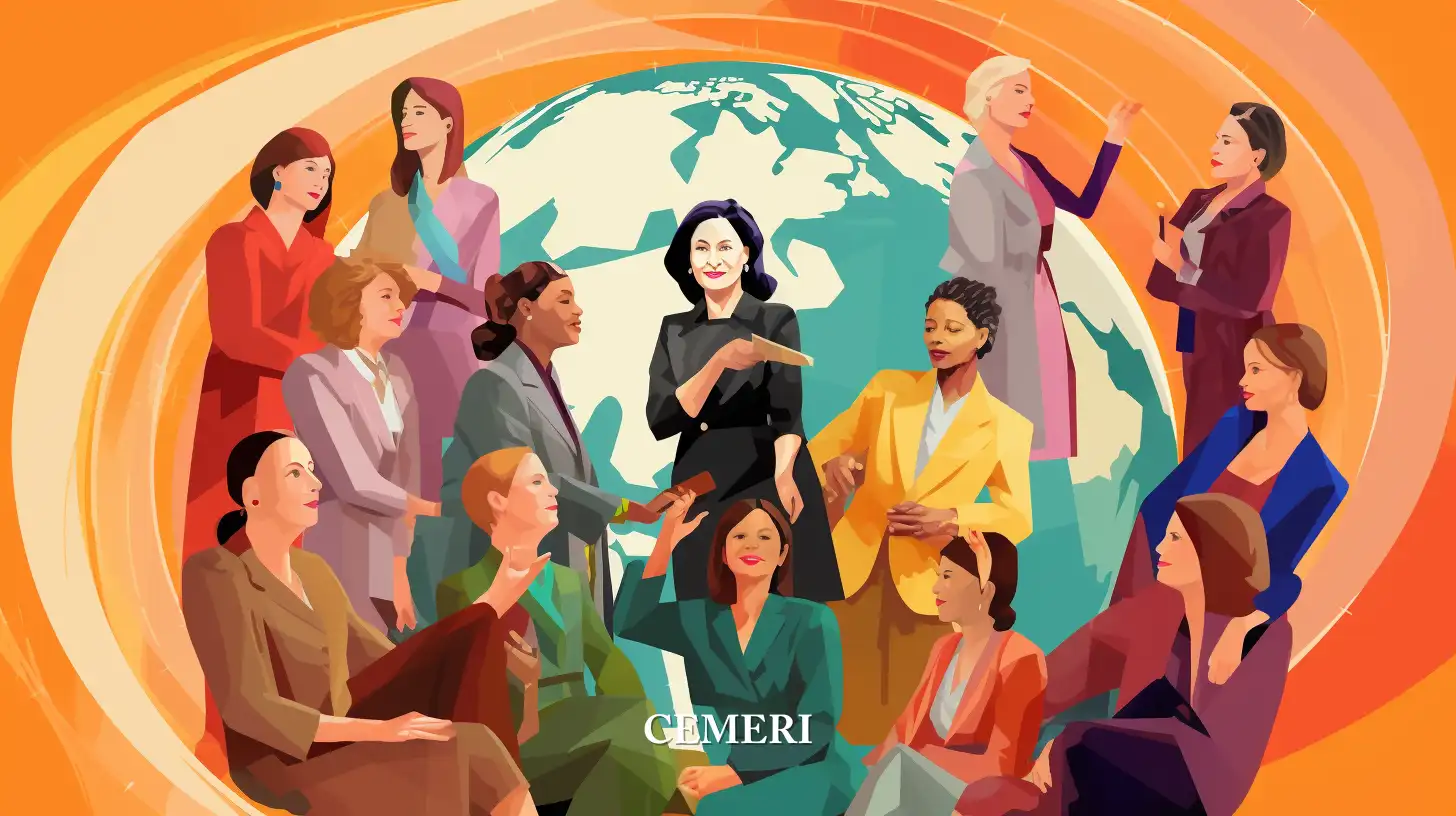Encyclopedia
Fernanda Vázquez
What is it and what does the feminist theory look for in International Relations?
- Feminist theory in International Relations is characterized by being heterogeneous and by understanding that there are multiple and different international realities.

The feminist movement and theory have permeated various areas of knowledge and human development, International Relations (RRII) are no exception. For this reason, it is extremely important to know what this theory is and what it is looking for in this specific discipline.
As a first point, it is necessary to mention that the International Relations were formally born in 1648 with the signing of the Peace of Westphalia treaty that ended the thirty years' war and gave way to the creation of nation-states.[ 1]
From that moment on, the International Relations were conceived as a discipline to understand the relations between countries and/or existing international actors; however, since its inception, they have been characterized as a highly homogeneous and androcentric discipline since they are "the product of a masculine vision of the international, which hides women's problems and favors the perpetuation of patriarchy [...] it is presented not only as neutral, but as totally asexual”[2].
On the other hand, it is necessary to briefly define what feminism is. According to the feminist Victoria Sau, it is a "theory and political practice articulated by women who, after analyzing the reality in which they live, become aware of the discrimination they suffer for the sole reason of being women and decide to organize to put an end to it, to change the society”[3].
The definition that she proposes is important to understand the role of feminism within the discipline of the International Relations since she takes up that this concept is a theory, but also a practice or movement; In addition, she understands that one of its main purposes is to make women aware of the disadvantageous situation in which they live.
Taking the above into account, feminism entered as a theory in the International Relations in the eighties with the purpose of adding new categories of analysis to the objectives and traditional subjects of study given that classical theories[4] had not been able to explain changes at the international level up to that time. Some of these categories that feminism added are gender or sex, which feminists in the International Relations understand as elements that influence the political and social sphere and, therefore, also internationally.[5]
This gave way to academics having the freedom to carry out research that allowed these new categories of analysis to be added. There is a large number of academics who have focused their research on this area, however, there are three authors who set the precedents for feminism in the International Relations: J. Ann Ticker, Cynthia H. Enloe and Jean Bethke Elshtain.
Feminist theory in the International Relations is characterized by being heterogeneous and by understanding that there are multiple and different international realities according to the people who inhabit a certain territory and that these visions are different if they are disaggregated by sex or gender.
In general, feminist theory in international relations seeks the following elements:
- Achieve greater visibility of women in the RRII in all areas, both in academia and in practice;
- Identify sex and gender as study variables since these elements reveal a more accurate reality of a certain object of study;
- Identify and make visible the different types of violence and the hierarchical and power relationships existing in international society to understand how they affect women in a differentiated way;
- Establish that the private —attributed to women— and that the private —attributed to men— can coexist in parallel and that they are mutually necessary. In addition, it seeks to establish that these areas are not determined by sex or gender and;
- Understand how “gendered”[6] is international politics.[7]
In this way, feminism in the International Relations came to make a critical front to the classic theories of the discipline that carry out a partial and incomplete analysis of the international reality since they do not take into account the experiences of women and other groups. or actors who do not possess “power”. What distinguishes this theory from other classical theories of international relations is its ethical commitment to inclusiveness and reflection on power relations in the discipline.[8]
As in all areas of knowledge, feminism came to the International Relations to carry out a much more complete analysis of the international reality, since it adds many more elements for its study, to reinterpret concepts that were defined from a masculine perspective and to make visible the experiences of women and other groups that are not taken into account in classical theories, from the theoretical part of the discipline to the practical part.
Although feminism has relatively little time within the international relations, it has achieved important achievements within international institutions such as the United Nations Organization (UN) or the establishment Feminist Foreign Policies; however, it is necessary that, as Latin Americans, we continue to develop knowledge on the subject and that we continue to question and criticize these new theories since they do not add intersectional elements or decolonial feminism.
Sources
1. Walter Asité-Burgos y María Cristina Rosas, Las Relaciones Internacionales en el Siglo XXI.. Universidad Nacional Autónoma de México (UNAM), Ciudad de México, 1ra. e d., 2017, 29 pp;
2. Birgit Locher, “Las relaciones internacionales desde la perspectiva de los sexos”, Nueva Sociedad (NUSO), no. 158 (1998), p. 1 [En línea]: https://nuso.org/articulo/las-relaciones-internacionales-desde-la-perspectiva-delos-sexos/ [Consulta: 19 de agosto, 2020];
3. Victoria Sau, Diccionario ideológico feminista, Icaria Editorial, España, 2000, p. 121;
4. Algunas de las teorías clásicas son el idealismo, el realismo, el liberalismo, la teoría de la interdependencia, la teoría de sistemas y el marxismo en Fuensanta Medina Martínez, “Teoría de las Relaciones Internacionales en el Siglo XXI”. Revista de El Colegio de San Luis, año VII, número 13 (enero a junio de 2017), pp. 265 – 284. [En línea]: https://revista.colsan.edu.mx/index.php/COLSAN/issue/view/35 [Consulta: 03 de noviembre, 2020];
5, Birgit Locher, “Las relaciones internacionales desde la perspetiva de los sexos”, p. 2;
6. Según el autor Francis Fukuyama, “generizada” se refiere a entender cómo la política internacional es “ejecutada por hombres, con intereses masculinos que son interpretados por otros hombres”. Francis Fukuyama, “Women and the Evolution of World Politics”, Foreign Affairs 77 (1998), p. 32 [En línea]: https://www.jstor.org/stable/20049048?origin=JSTOR-pdf [Consulta: 20 de agosto, 2020];
7. Fernanda Vazquez Rojas, La Política Exterior Feminista: el caso de estudio de Canadá (2017 – 2019). Lecciones para México (dir. Cynthia Juárez Fuentes). Universidad Nacional Autónoma de México (UNAM). México. [Tesis de Licenciatura]. [No publicada];
8. Jacqui True, “Feminism and Gender Studies in International Relations Theory, International Studies Associaton and Oxford University Press, (2017). [En línea]: https://doi.org/10.1093/acrefore/9780190846626.013.46.
Birgit Locher, “Las relaciones internacionales desde la perspetiva de los sexos”, Nueva Sociedad (NUSO), no. 158 (1998), p. 1 [En línea]: https://nuso.org/articulo/lasrelaciones-internacionales-desde-la-perspectiva-de-los-sexos/.
Christine Sylver, “Presentando a Elshtain, Enloe y Tickner: una mirada a los esfuerzos feministas más importantes antes de continuar el viaje”. Revista Relaciones Internacionales 27 (2014-2015): pp. 117-152.

